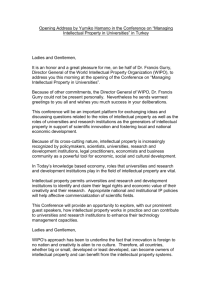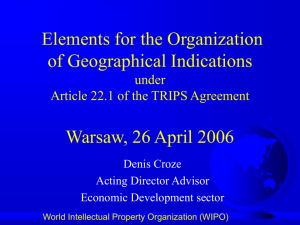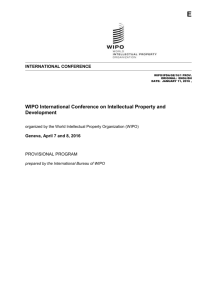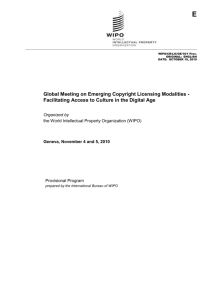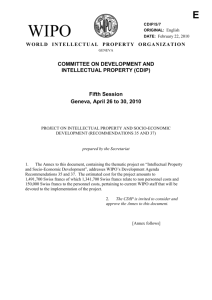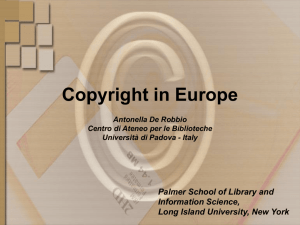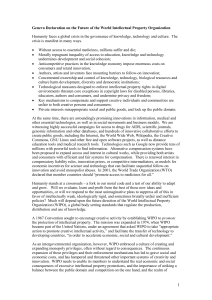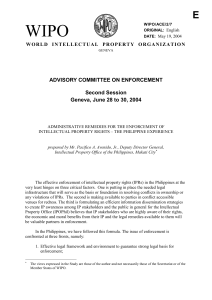Strategic Highlights (annex 3)
advertisement
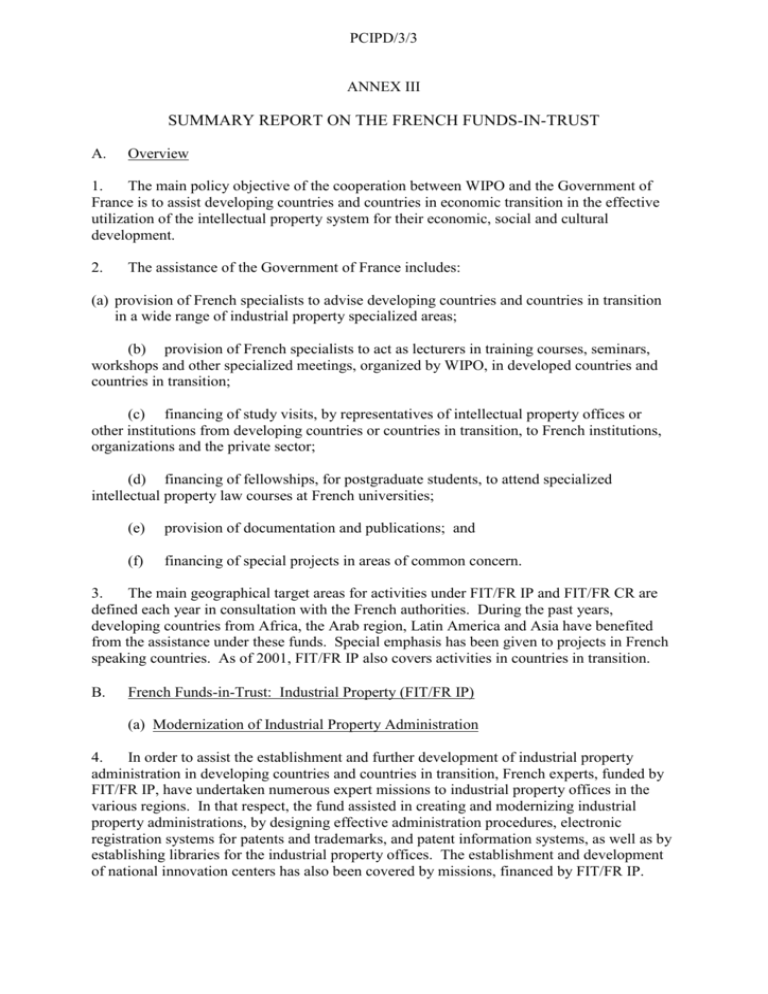
PCIPD/3/3 ANNEX III SUMMARY REPORT ON THE FRENCH FUNDS-IN-TRUST A. Overview 1. The main policy objective of the cooperation between WIPO and the Government of France is to assist developing countries and countries in economic transition in the effective utilization of the intellectual property system for their economic, social and cultural development. 2. The assistance of the Government of France includes: (a) provision of French specialists to advise developing countries and countries in transition in a wide range of industrial property specialized areas; (b) provision of French specialists to act as lecturers in training courses, seminars, workshops and other specialized meetings, organized by WIPO, in developed countries and countries in transition; (c) financing of study visits, by representatives of intellectual property offices or other institutions from developing countries or countries in transition, to French institutions, organizations and the private sector; (d) financing of fellowships, for postgraduate students, to attend specialized intellectual property law courses at French universities; (e) provision of documentation and publications; and (f) financing of special projects in areas of common concern. 3. The main geographical target areas for activities under FIT/FR IP and FIT/FR CR are defined each year in consultation with the French authorities. During the past years, developing countries from Africa, the Arab region, Latin America and Asia have benefited from the assistance under these funds. Special emphasis has been given to projects in French speaking countries. As of 2001, FIT/FR IP also covers activities in countries in transition. B. French Funds-in-Trust: Industrial Property (FIT/FR IP) (a) Modernization of Industrial Property Administration 4. In order to assist the establishment and further development of industrial property administration in developing countries and countries in transition, French experts, funded by FIT/FR IP, have undertaken numerous expert missions to industrial property offices in the various regions. In that respect, the fund assisted in creating and modernizing industrial property administrations, by designing effective administration procedures, electronic registration systems for patents and trademarks, and patent information systems, as well as by establishing libraries for the industrial property offices. The establishment and development of national innovation centers has also been covered by missions, financed by FIT/FR IP. PCIPD/3/3 Annex III, page 2 5. In order to strengthen the industrial property system in the various regions, FIT/FR IP has also financed a number of study visits to relevant institutions and organizations in France, and provided on-the-job-training. (b) Training and Academic Teaching 6. An important part of the trust is designed to support WIPO’s growing training activities in the various regions. Experts from INPI and other institutions in France, including university professors, judges and lawyers, financed by FIT/FR IP, have contributed to WIPO seminars, meetings and workshops in developing countries and countries in transition, on different aspects of intellectual property, such as the law and administration of patents, trademarks, designs and geographical indications, patent information and documentation, licensing and the transfer of technology, enforcement of intellectual property rights, relevance of intellectual property to development, and promotion of innovation. 7. Moreover, FIT/FR IP has financed fellowships for postgraduate students to specialized postgraduate intellectual property programs of French universities, namely the universities of Montpellier and Nantes, as well as the Centre d’études internationales de la propriété intellectuelle (CEIPI) in Strasbourg. Intellectual property law professors from developing countries have also benefited from the fund by undertaking study visits to French universities. 8. The fund also co-finances certain WIPO cooperation for development activities with universities to further develop intellectual property teaching on the university level. A WIPO fact-finding mission to three law faculties in the Islamic Republic of Iran was organized in early 2002 under the fund, and provided detailed comments on new teaching curricula drafted by each faculty. In addition, the fund has financed, over the past years, missions of French intellectual property law professors to La Sagesse University in Beirut, Lebanon, in order to give specific lectures in the intellectual property postgraduate program. (c) Promotion and Protection of Geographical Indications 9. France has high-level expertise in the area of protection of geographical indications, and this area has been identified as particularly suitable for activities under the fund. In this framework, the activities financed under FIT/FR IP include fact-finding missions of French experts to advise on the protection of geographical indications. Study missions were also organized to specialized French institutions, such as the Institut national des appellations d’origine (INAO) and the Ministère de l’agriculture et de la pêche. 10. In addition, special projects on the development of a system for the protection of geographical indications, on the national as well as on the regional level, are carried out under FIT/FR IP, in cooperation with specialized institutions in France. A two-year special project for the promotion and protection of geographical indications in four West-African countries (Burkina Faso, Cameroon, Côte d'Ivoire and Guinea), started in 2002 under the fund. Another project is being implemented in the Latin American region (Bolivia, Costa Rica, Ecuador, Guatemala and Uruguay), to further develop the protection and use of appellations of origin in the region. PCIPD/3/3 Annex III, page 3 (d) Enforcement of Intellectual Property Rights 11. In 2000 and 2001, the fund financed the overall cost of a WIPO Academy on the enforcement of intellectual property rights for judges from 20 developing countries under continental law jurisdiction. This Academy was held in two sessions, in Paris and Geneva. It consisted of a number of lectures on intellectual property rights enforcement, exchange of case-law studies among the participating judges, and visits to French courts, police and customs institutions as well as to WIPO headquarters. The case-law studies have been compiled by WIPO in a publication, entitled Recueil de Cas Pratiques, which is designed to serve as a tool for training and further research on the enforcement of intellectual property rights in developing countries. 12. Based on the success of the first two sessions of this Academy, WIPO is organizing a third session, again to be funded by FIT/FR IP, in 2002, for judges of certain countries of Eastern Europe and Central Asia. As in the past, it is planned that the case-law submitted in this session will be published by WIPO. C. French Funds-in-Trust: Copyright (FIT/FR CR) 13. The FIT/FR CR is designed to support WIPO’s cooperation activities specifically in the area of copyright and related rights. 14. Over the past years, the fund has financed practical training for officials from developing countries and countries in transition at collective management societies in France, such as the Société de perception et de distribution des droits des artistes-interprètes de la musique et de la danse (SPEDIDAM and the Société des auteurs, compositeurs et éditeurs de musique (SACEM) in Paris. 15. In addition, this fund-in-trust has co-financed, with WIPO, the Arab sub-regional workshop on collective management of copyright and related rights, held in Morocco in May 2001. In this meeting, the situation of the collective management systems in five Arab countries (Algeria, Egypt, Lebanon, Morocco, Tunisia) and related topics were extensively examined and a plan of action was established. Specific aspects of collective management, with a particular view to the practical implementation of a management system, were presented by experts in several workshops. 16. In 2002, the fund will again co-finance a WIPO sub-regional meeting on collective management of copyright and related rights, in the West-African region. [Annex IV follows]


![Invitation [word format]](http://s3.studylib.net/store/data/007096478_1-54334bf5ab877bf1ebd233e686a3f8bb-300x300.png)
